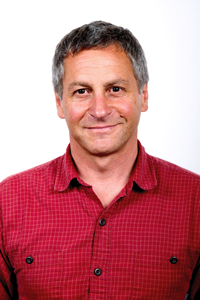Robert Blatt, the 54-year-old chairman and chief executive of mobile marketing platform MomentFeed in Santa Monica, has three lively daughters, a surfing addiction and a yoga habit. He’s maintained an active lifestyle throughout the 25 years that he’s worked in senior management positions, employed previously as senior vice president of product development at Ascent Media, vice president and general manager of personal media at AOL and chief executive of Outcome. We spoke with Blatt about how to avoid stress – even when you’re the chief executive of a startup.
Question: Describe your morning routine.
Answer: If there are good waves, I’ll hit the water at dawn and I’ll get a good surf in for an hour, hour and a half, and I can still get to office before nine. Or, I will do yoga. I’ve been practicing yoga for 35 years. I’ve also got three kids getting ready for school and they walk in during my yoga and ask me a math homework question. I live in Santa Monica, so I can ride my bike to work every day.
Was this a conscious decision when you moved, to eliminate the Los Angeles commute?
Yes. We used to live in the Bay Area and most of my career was in Silicon Valley. We realized that if we didn’t eliminate the commute time, there would not be enough time for family. I realized when I was 40, right before the kids were born, that I love doing software startups, but they have a high level of intensity so we had to be methodical about life. In San Francisco, that was impossible. We spent a lot of our lives in cars and on the Bart. So we literally moved to Santa Monica for the work/life balance. It was also because of surfing. In San Francisco, between driving to the beach to go surfing and driving to work, I was racking up an incredible amount of time in car. In Santa Monica, everything we do we can get to via bike.
How do you achieve work/life balance?
When I first started in business, my personal and professional lives were two different things. In the last few years, my professional life has infiltrated my personal life, and the only way to create balance is to let my personal life infiltrate my work life. The energy required to be something different at work than you are at home, that energy is impossible. So the first thing I do to maintain balance is that I don’t make a distinction between Robert working and Robert with friends. The second thing is to recognize that life expectancy is going to be longer than any of us ever expected, so I view work as a marathon, not a sprint. I take a long term view and that relieves the panic a lot of people feel every day. I’ve done some of my best work at companies that were a colossal failure. The key is to focus on just doing a really good job every day and constantly growing your relationships, which will outlast the place you are working right now, and creating a body of work you are proud of. I know it’s crazy to say as the CEO of a startup, but I’m not particularly stressed.
Startups have a reputation for blurring the lines between things we traditional understand as professional and personal – casual clothes, ping pong tables, etc. What effect does that have on the business culture?
In the old days, you put on a business suit and did things that you never would have done in your community of friends. Now that the barriers are gone, people are less likely to do something wrong just because it’s good for business. The temptation to do those things has been somewhat offset by the fact that we are now humans at work.
How do you make time for family?
The first thing that I do at work is that I get clear on what I want to do that day. I very consciously choose what I won’t do and focus on what I will. That eliminates wasted energy. I decide what things I am going to do with my family that day. If you don’t get conscious about what you will do with your day, you will get sucked into things that feel urgent but probably aren’t. And then, I gotta tell you, really, the most important thing when it comes to work/life balance is the partner that you choose to go through life with. There are very few decisions that are critical. At the top of that list is the person you choose as a partner. My wife Bailey, she really understands and supports what I do professionally, and I understand and support what she does professionally, so there is no conflict about our choices. She surfs as well as I do. We play together constantly. The best choice I made was 14 years ago when we got married.
How do you stay focused?
Very early in my career, I went to Shelly Brown, the head of HR at the company I was working for, and I asked her a question, and she said, “I can’t give you a full answer right now. Let’s find a time.” What it taught me was that being 100 percent present for a person and for the task you’re doing is the only way to stay focused. Don’t sit at a meeting with your laptop open. Choose what you will and won’t do and be completely present for those things. Then, you actually get it done.

